



Will ChatGPT replace search engines as we know them right now?
share on
The short answer, in my opinion, is not just yet. I was intrigued when I heard about ChatGPT. Even more so when I read articles about Google ranking up their AI capabilities to withstand potential competition to their Google Search business. If Google feels that threatened, it must be good, right?
And it is. The ChatGPT capabilities are remarkable. I tested it while researching for my upcoming trip to Italy. Instead of browsing through countless pages of search results on Google and spending hours, if not days, putting together an itinerary, with ChatGPT I had 1 chatbot that gave me most of the necessary answers in a matter of seconds. I got almost all the info I needed – from an actual travel itinerary to visit the Amalfi coast based on my set dates, to getting brief overviews of the key towns to visit (inclusive of the stroller friendly ones), and recommended hotels based on my budget. That’s pretty impressive and extremely convenient.
The research I did was just scratching the surface of what the application can actually do – from creating a simple script to developing a website and writing poems and essays on variety of subjects (I tested it on the Industry 5.0 topic) to solving complex mathematical tasks and writing ad copies, just to name a few.
But although ChatGPT does provide results fast, and saves a lot of time for its users, there were several gaps which made me think that the traditional search engines will not go out of business just yet (or likely not any time soon):
- The correctness of the answers is unknown, really. Search engines base their search results on site authority amongst many other variables. When you skim through the search results, you can easily identify if the article or source is reputable or not. In the case of ChatGPT, you will purely rely on the fact that the machine knows what it is talking about, since it does not share its sources in detail.
- ChatGPT is a text-based application, which means there are no images or maps. During my research, I would have liked to see images to accompany the sightseeing recommendations I was given. And that the hiking trails I was recommended would come with a trail map.
- I wonder if a new or small players will be given a chance to appear in the answers. With most search engines (such as Google), when a business or author publishing content or products/services is new, it can use Search Engine Optimisation or ads to appear in results. With ChatGPT the answers will likely be skewed towards already known and established sources and providers, and newcomers might be ignored.
Having said that, I see endless opportunities for improving work efficiencies by using ChatGPT, such as writing or improving content and copy, to check web development codes for errors, or just to help in crafting stronger emails. Within the agency, we are already exploring ChatGPT along with several other AI tools to help increase the team’s efficiency with meta description writing for search engine optimisation.
All in all, ChatGPT is a powerful application that can greatly improve the way we access information, generate output, and find answers to our queries. However, it's important to note that this technology may present a challenge for small or new businesses to be discovered in comparison to traditional search engines. It is likely that this issue will be addressed in the future, and new opportunities will be created for these businesses. Open AI, the holding company of ChatGPT, is a non-profit research organiation and may not follow traditional search engine monetisation strategies, but I do foresee them providing options or strategies for new players to have an equal chance of being discovered.
The full impact of ChatGPT on businesses, advertising agencies, and consumers is yet to be fully understood. However, I am excited to see how it may shape the future of information access, discovery, and productivity, and see how its applications transcend the space of media. The possibilities appear to be endless and I'm looking forward to seeing how it all unfolds.
In the meanwhile, I will start using the application for spell-checking and paraphrasing (since I’m not a native English speaker), and it does come handy!
The writer of the piece is Elina Peek-Lantz of Reprise Malaysia.
share on
Free newsletter
Get the daily lowdown on Asia's top marketing stories.
We break down the big and messy topics of the day so you're updated on the most important developments in Asia's marketing development – for free.
subscribe now open in new window
